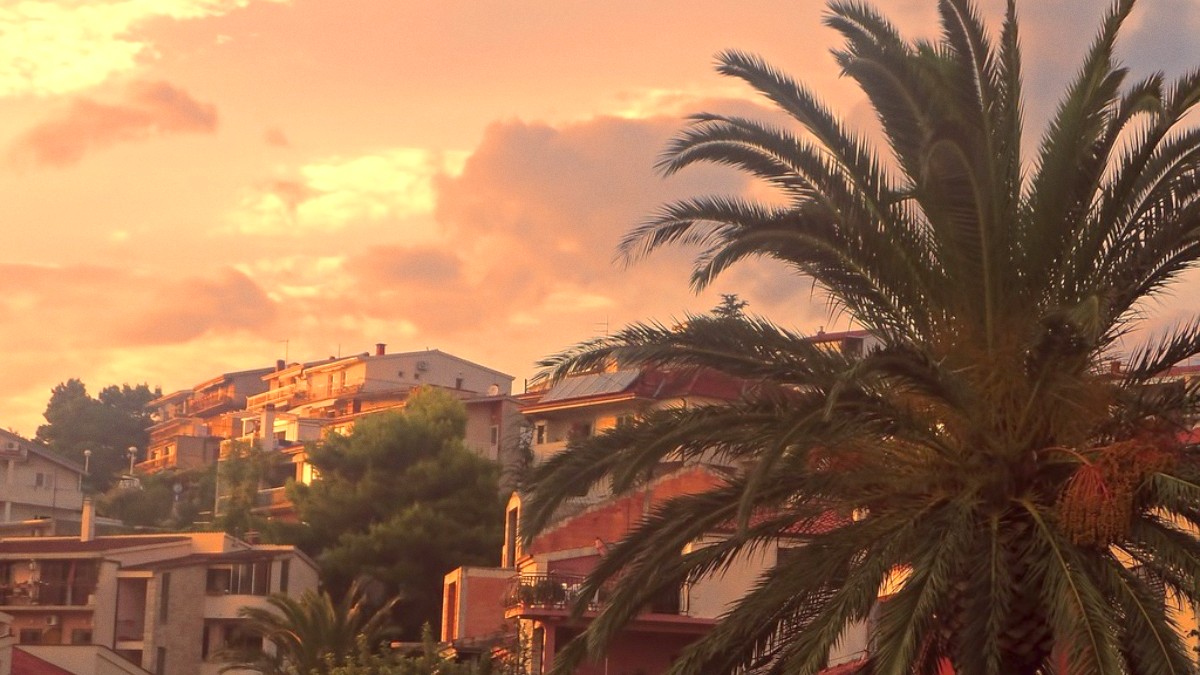
Croatia
Makarska’s climate brings hot, dry summers and mild, wet winters. Summer (June - August) months are very hot and dry. Average daily temperatures span from 25°C to 30°C (77°F to 86°F). Sea temperatures are perfect for swimming, averaging 23-26°C (73-79°F).
Autumn (September - November) brings milder temperatures and more rainfall. September stays warm, with averages of 20-25°C (68-77°F), and the sea stays pleasant for swimming. October and November see cooler averages. Spring (March - May) presents a gradual warming trend and less rainfall.
Makarska has unique weather phenomena to consider.
The Bora wind (bura) is a strong, cold, dry wind from the northeast. It occurs in winter and spring, causing temperature drops and sometimes disrupting ferry services. The Sirocco wind (jugo) is a warm, humid wind from the south-southeast. It brings rain and choppy seas, more common in autumn and winter.
A risk during hot, dry summer months.
Pay attention to local news and warnings during dry periods.
Exercise caution in forested areas and follow all local regulations.
Temperatures can exceed 35°C (95°F) in July and August.
Drink plenty of water and seek shade during peak sun hours.
Avoid strenuous outdoor activities during the hottest parts of the day.
Intense thunderstorms can occur, especially in late summer.
Move indoors if a storm approaches, characterized by heavy rain and lightning.
Check weather reports when planning outdoor activities.
Visit in July and August for the warmest sea and sun. Late June and early September also present pleasant temperatures with fewer crowds.
The period from June to September is ideal for jet skiing, parasailing, diving, and other water-based activities.
May-June and September-October deliver cooler temperatures and clearer skies, making hiking comfortable.
Shoulder seasons (May-June, September-October) offer comfortable temperatures and fewer crowds. This makes exploring the Old Town and museums enjoyable.
Croatia is part of the Schengen Area, which simplifies travel for many visitors.
Non-EU/EEA nationals who do not have a visa-free agreement with the Schengen Area typically need a Schengen Visa. This is a short-stay visa (Type C) for tourism or business, allowing stays of up to 90 days within any 180-day period.
Citizens of many countries can enter Croatia without a visa for tourism or business. This includes citizens from the United States, Canada, United Kingdom, Australia, New Zealand, Japan, South Korea, and most South American countries.
Your passport must remain valid for at least three months beyond your intended departure date from the Schengen area. It also needs to have been issued within the last 10 years.
You may need to show proof of sufficient money for your stay. This could be bank statements or credit card limits. A ticket proving your planned departure from the Schengen area may also be needed.
Valid for at least 3 months beyond departure, issued within 10 years.
A valid Schengen visa if your nationality requires it.
Printouts or digital copies of hotel bookings or invitation letters.
Proof of onward or return travel from the Schengen area.
Mandatory for Schengen visa, recommended for all travelers.
Croatia uses the Euro, making financial transactions straightforward for many international visitors.
The official currency of Croatia is the Euro (EUR) (€). Croatia adopted the Euro on January 1, 2023.
Daily costs in Makarska vary by travel style. These are average daily estimates. Peak season prices can be higher.
These are general price guidelines, and peak season prices will be higher.
Makarska is generally a safe destination, but preparation is good.
Ensure your general vaccinations are up to date (MMR, Diphtheria-Tetanus-Pertussis, Polio, Flu).
Consult your doctor or a travel clinic well in advance for personalized recommendations.
No specific vaccinations are generally needed for entry to Croatia beyond routine ones.
Prevention is good.
The Mediterranean sun is strong. Use high SPF sunscreen, wear hats and sunglasses, and seek shade during peak sun hours (11 AM - 4 PM).
Sea urchins are present on rocky parts of the seabed. Wear water shoes or sandals when swimming or walking in shallow rocky areas to protect your feet. Mosquitoes can be present, especially at dusk; use insect repellent.
Tap water in Makarska is safe to drink. Food standards are generally high.
Dial 112 for all emergencies (police, ambulance, fire).
Provides general medical services and an emergency department (Stjepana Ivičevića 2).
Widely available for over-the-counter and prescription medications (look for the green cross sign).
Makarska is generally considered a very safe destination for tourists. However, some risks remain.
Keep these numbers handy during your trip.
Dial 112 for Ambulance, Police, and Fire services.
Dial 1987 (HAK) if you plan to drive and need roadside help.
Dial 112 or contact local HGSS stations; useful for hiking in Biokovo.